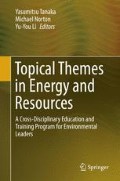Abstract
The concept of limits to growth is introduced and the future scenarios involving collapse due to pollution or resource depletion explained. These illustrate the basic problem that we confront on natural resources and the environment within a finite planet. The expanding demand for resources is not only causing the reserve/production ratio to fall below 10 years by 2040 for many metals but aggressive mining causes immense damage to the environment and ecosystems and to the people living there. Methods of measuring impact are introduced—for instance the ecological foot print which shows that 5.3 globes would be needed if all people in the world attained the same affluent lifestyle as the USA. To avoid this future requires reducing consumption and dependence on growth and to focus instead on happiness as our ultimate purpose. This chapter introduces models and ways of thinking which treat economy and industry as intermediates to that overall purpose and ensure natural resources are maintained to provide the essential basic support for humanity. The example of Cuba which is applying some of these principles is also introduced.
Access this chapter
Tax calculation will be finalised at checkout
Purchases are for personal use only
References
Frey, B., and A. Stutzer. 2001. Happiness and economics: How the economy and institutions affect human wellbeing. New Jersey: Princeton University Press, Princeton.
Layard, R. 2011. Happiness: Lessons from a new science. Penguin, London.
Maslow, A. 1943. Maslow’s hierarchy of needs. http://www.abraham-maslow.com/m_motivation/Hierarchy_of_Needs.asp. Accessed 10 June 2014.
Meadows, D. 1999. Indicators and information systems for sustainable development, sustainable cities. Earthscan, London.
Meadows, D. H., D. L. Meadows, and J. Randers. 1972. The limits to growth. Universe Books, New York.
Meadows, D. H., D. L. Meadows, and J. Randers. 2004. The limits to growth: The 30-year update. Vermont: Chelsea Green Publishing, Chelsea.
Nakanishi, J. 1994. Environmental strategy of water. Tokyo: Iwanami Publisher Iwanami Shoten Publishes, Tokyo, Japanese book..
Nakanishi, J. 2003. Calculation of environmental risks. Tokyo: Iwanami Publisher Iwanami Shoten Publishers, Tokyo, Japanese book.
Rockstrom, J., W. Steffen, K. Noone, A. Persson, F. Chapin, and E. Lambin. 2009. A safe operating space for humanity. Nature 461:472–475.
Schumacher, E. 1973. Small is beautiful: A study of economics as if people mattered. Blond & Briggs Ltd., London.
Takeda, K. 2000. Stop the recycling. Seishun Publishers, Tokyo, Japanese book.
Taniguchi, S. 2012. Limits to resources, economic growth and happiness. Journal of Shanghai Jiaotong University (Science) 17 (3): 1–6.
Wackernagel, M., and W. Rees. 1995. Our ecological footprint: Reducing human impact on the earth (new catalyst bioregional series). Philadelphia: New Society Publishers, Canada.
WCED. 1987. Our common future. Oxford: Oxford University Press, UK.
Weitzsaecker, E. U., A. B. Lovins and L. H. Lovins 1998. Factor Four, Japanese Edition, Energy Conservation Center, Tokyo.
Yoshida, T. 2009. Advanced decline country: Cuba. Tokyo: Tsukiji Shokan, Tokyo (Japanese book).
Author information
Authors and Affiliations
Corresponding author
Editor information
Editors and Affiliations
Rights and permissions
Copyright information
© 2015 Springer Japan
About this chapter
Cite this chapter
Taniguchi, S. (2015). Limits to Resources, Economic Growth and Happiness. In: Tanaka, Y., Norton, M., Li, YY. (eds) Topical Themes in Energy and Resources. Springer, Tokyo. https://doi.org/10.1007/978-4-431-55309-0_3
Download citation
DOI: https://doi.org/10.1007/978-4-431-55309-0_3
Published:
Publisher Name: Springer, Tokyo
Print ISBN: 978-4-431-55308-3
Online ISBN: 978-4-431-55309-0
eBook Packages: EnergyEnergy (R0)

